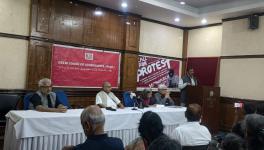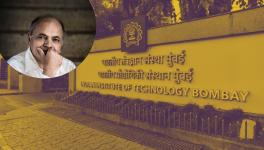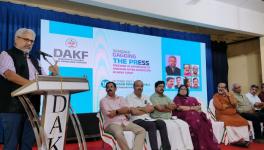Negative News New Spin to Control Media

Representational use only. Image Courtesy: PxHere
It was a day after India celebrated 77 years of living free that the Yogi Adityanath government in Uttar Pradesh directed its officials to probe ‘negative’ news items published in media outlets.
Apart from the timing of the order, issued on 16 August, the day after Independence Day celebrations, it raises questions about whether the government can be the sole fact-checker given the media is obliged to put information in the public domain under Article 19 of the Constitution. In other words, the freedom of speech and expression under Article 19 mandates the press and media to disseminate information.
The Adityanath government is certainly not the first to question the veracity of news, especially news critical of the government, and it won’t be the last. What is interesting is that the State government’s order comes against a backdrop in which the Bombay High Court is still looking into a bunch of petitions (filed by satirist Kunal Kamra, the Editors Guild of India and the Association of Indian Magazines), challenging the central government’s new Information Technology Rules and its decision to appoint a Fact Check Unit (FCU).
The new Information Technology Rules, prepared by the central Ministry of Electronics and Information Technology (MeitY) require social media intermediaries to take down or modify content concerning the central government if the government-mandated FCU directs them to do so. The Centre told the court it would not notify the FCU under MeitY until 10 July, and subsequently extended the deadline to 28 July, and then 3 September. However, it is pertinent that the matter is still under consideration by the Bombay High Court.
According to legal news tracker Bar and Bench, the judges looking into the petitions had said during the 6 July hearing, “As we are approaching 2024, people will say things in campaign trail. Suppose an online person questions the statements made in campaign trail by a political spokesperson, calls it out, and if the FCU says remove it, how can it do that? Is that the business of the government?”
Well, the Bharatiya Janata Party (BJP) government has certainly made it its business to control news.
Two years ago, the Information and Broadcasting Ministry had also directed the Press Information Bureau (PIB), a government outfit, to verify whether news items were genuine or not, prompting several media outlets to question the wisdom of the directive. Can the government be judge and jury and pass judgements on the news?
By the way, the FCU proposed under MeitY will be in addition to the fact-checking units the BJP government has set up under the PIB. And quite apart from both these efforts are individual state governments, like Uttar Pradesh, stepping in with their own orders and rules to “fact-check” the press.
India has had a tenuous relationship with the free press since independence. Several governments in the past have displayed an irrepressible urge to control the media, from former prime minister Rajiv Gandhi’s Defamation Bill in 1988 to other attempts made by successive governments to rein in the media. What separates the earlier attempts from the present is those moves did not go uncontested. There was pushback from the press itself, which condemned attempts to bludgeon free speech.
The times were also different: Rajiv Gandhi had to withdraw the legislation—which was prompted by an urge to control “scurrilous writings”—in Parliament. The press was united in opposing his Defamation Bill. Back then, journalists were unafraid of asking questions and holding the government accountable.
According to the latest media reports, the order dated 16 August passed by the Principal Secretary to the Uttar Pradesh Chief Minister directs all concerned district and divisional administrative officials to seek explanations from media houses if the facts in their story are found to be “twisted” or “false” in order to tarnish the image of the government. This would have a chilling effect on the free functioning of the media ahead of the 2024 General Election.
As pointed out by The Wire, “Although this is the latest order on the part of the Adityanath government to ‘control’ the media months ahead of the 2024 Lok Sabha election, the truth is that the Uttar Pradesh government under Adityanath has been accused of suppressing media freedom with lawsuits and criminal cases from 2017, when it assumed office. A report published by the Committee Against Assault on Journalists in 2022 said that ever since Yogi Adityanath took over as the head of the state, at least 48 journalists had been physically assaulted and 66 others had been booked or arrested.”
While the case of journalist Siddique Kappan who spent a little over two years in jail without trial for reporting on a gang rape case is too well-known, a few years ago, freelance journalist Pawan Jaiswal was charged with conspiracy for having filmed government school students in Uttar Pradesh’s Mirzapur district eating rotis with salt as their midday meal. He was later given a clean chit after a probe. The journalist died of cancer last year.
Increasingly, the decisions of the BJP government to control the media also raise the question of whether institutions set up by Acts of Parliament are being rendered redundant. For instance, what happens to the Press Council of India (PCI), a quasi-judicial statutory body whose mandate is to enquire into the genuineness of news? The PCI, though headed by a former Supreme Court Judge, has been described as a toothless body, but it has its job cut out, which is to address complaints of falsehoods in disseminating news.
The author is an independent journalist. The views are personal.
Get the latest reports & analysis with people's perspective on Protests, movements & deep analytical videos, discussions of the current affairs in your Telegram app. Subscribe to NewsClick's Telegram channel & get Real-Time updates on stories, as they get published on our website.
























